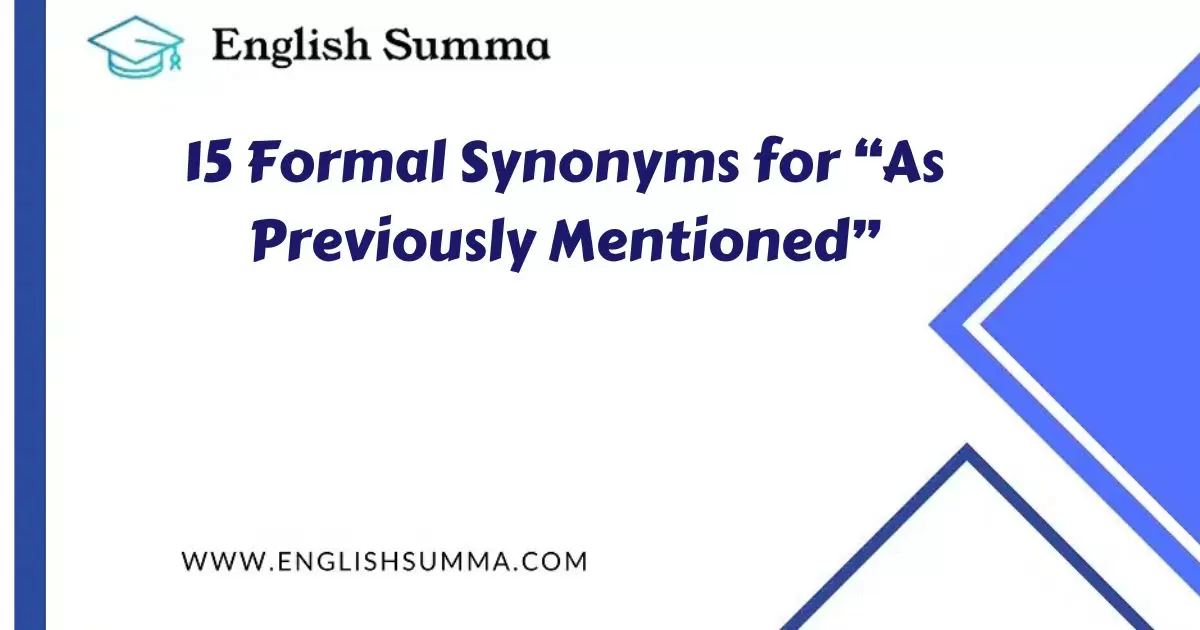In the realm of formal writing, repetition can sometimes detract from the clarity and professionalism of your message. When conveying information, especially in professional correspondence, it’s essential to vary your language while maintaining coherence and precision. One common phrase that often requires alternatives is “as previously mentioned.” This article will explore 15 formal synonyms for this expression, offering scenario examples to demonstrate their usage effectively.
Why Avoid Repetition?
Before delving into alternatives, let’s briefly examine why it’s crucial to avoid repetitive language in formal communication. While repetition can serve a rhetorical purpose in some contexts, such as emphasizing a point for persuasive effect, excessive repetition can lead to reader disengagement or even irritation. Employing synonyms for commonly used phrases like “as previously mentioned” not only enhances the readability of your writing but also showcases your linguistic dexterity and attention to detail.
1. As Stated Earlier
When referring to previously discussed points in a formal setting, “as stated earlier” offers a succinct and direct alternative.
Scenario Example:
Dear Justin,
Thank you for your inquiry regarding the upcoming project timeline. As stated earlier, the deadline for the initial draft is set for next Friday, March 12th.
Best regards,
James Wilson
2. Referring Back
Using “referring back” signals a return to a previous topic or statement, maintaining flow and coherence in your communication.
Scenario Example:
Dear Team,
In our last meeting, we discussed the budget allocation for the upcoming fiscal year. Referring back to those discussions, please find attached the revised budget proposal for your review.
Best regards,
James Wilson
3. As Already Mentioned
The phrase “as already mentioned” serves as a reminder of prior information, ensuring clarity and avoiding redundancy.
Scenario Example:
Dear Mr. Taylor,
As already mentioned during our initial consultation, our company specializes in sustainable energy solutions tailored to commercial properties.
Sincerely,
James Wilson
4. As Previously Noted
Utilizing “as previously noted” emphasizes the importance of information mentioned earlier in the communication process.
Scenario Example:
Dear Justin,
As previously noted, the quarterly sales report indicated a significant increase in online purchases compared to the previous year.
Best regards,
James Wilson
Don’t miss to read out this” Synonyms for “Big-Picture Thinker” on a Resume
5. I’ve Already Mentioned
Employing “I’ve already mentioned” places emphasis on the speaker’s prior communication, ensuring that important points are not overlooked.
Scenario Example:
Dear Team,
Please remember to adhere to the new security protocols I’ve already mentioned in our recent email regarding data protection measures.
Kind regards,
James Wilson
6. As Discussed
Using “as discussed” signals a return to topics previously deliberated upon, maintaining coherence in the conversation.
Scenario Example:
Dear Justin,
Thank you for your prompt response. As discussed, I will follow up with the client regarding their specific requirements for the project.
Warm regards,
James Wilson
7. I’ve Already Stated
Employing “I’ve already stated” emphasizes the speaker’s prior communication, ensuring clarity and avoiding repetition.
Scenario Example:
Dear Mr. Taylor,
I’ve already stated our commitment to delivering exceptional customer service, and I assure you that your concerns will be addressed promptly.
Best regards,
James Wilson
8. As I’ve Stated
Using “as I’ve stated” reinforces the speaker’s prior communication, guiding the recipient back to previously discussed points.
Scenario Example:
Dear Justin,
As I’ve stated in our previous correspondence, the project timeline remains unchanged despite recent challenges.
Sincerely,
James Wilson
9. As We’ve Already Explored
Employing “as we’ve already explored” acknowledges previous discussions, fostering continuity in the conversation.
Scenario Example:
Dear Team,
As we’ve already explored in our strategy sessions, diversifying our marketing channels is essential for reaching new demographics.
Best regards,
James Wilson
10. As We’ve Already Covered
Utilizing “as we’ve already covered” reminds the recipient of previous discussions, ensuring continuity in the conversation.
Scenario Example:
Dear Justin,
As we’ve already covered in our training sessions, it’s crucial to prioritize safety protocols in the workplace to mitigate potential risks.
Best regards,
James Wilson
11. As Previously Indicated
Using “as previously indicated” directs attention to prior statements or instructions, reinforcing their importance.
Scenario Example:
Dear Mr. Taylor,
As previously indicated, please submit your expense reports by the end of the week for timely processing.
Sincerely,
James Wilson
12. As Mentioned Earlier
Employing “as mentioned earlier” succinctly refers back to previous points in the conversation, maintaining clarity and coherence.
Scenario Example:
Dear Team,
As mentioned earlier in our team meeting, I would like to remind everyone of the upcoming training session on new software implementation.
Warm regards,
James Wilson
13. As Brought Up Before
Utilizing “as brought up before” acknowledges previous mentions of a topic, guiding the recipient’s attention back to earlier discussions.
Scenario Example:
Dear Justin,
As brought up before, the marketing department is exploring new strategies to enhance brand visibility in the digital space.
Best regards,
James Wilson
14. As Highlighted Previously
Using “as highlighted previously” emphasizes the significance of earlier points or considerations in the conversation.
Scenario Example:
Dear Mr. Taylor,
As highlighted previously, the success of the project hinges on effective collaboration and clear communication among team members.
Sincerely,
James Wilson
15. As Alluded to Earlier
Employing “as alluded to earlier” subtly refers back to previous mentions or implications, maintaining coherence in the discussion.
Scenario Example:
Dear Justin,
As alluded to earlier, our company’s expansion plans include entering new markets in the Asia-Pacific region.
Warm regards,
James Wilson
Pros and Cons of Using Formal Synonyms
Pros:
- Enhances readability and professionalism.
- Demonstrates linguistic versatility and attention to detail.
- Avoids monotony and repetition in formal communication.
- Maintains coherence and clarity in the message.
Cons:
- Overuse of synonyms may appear contrived or unnatural.
- Requires careful consideration of context to ensure appropriateness.
- Can potentially obscure the intended meaning if not used judiciously.
- May necessitate additional time and effort to select suitable alternatives.

